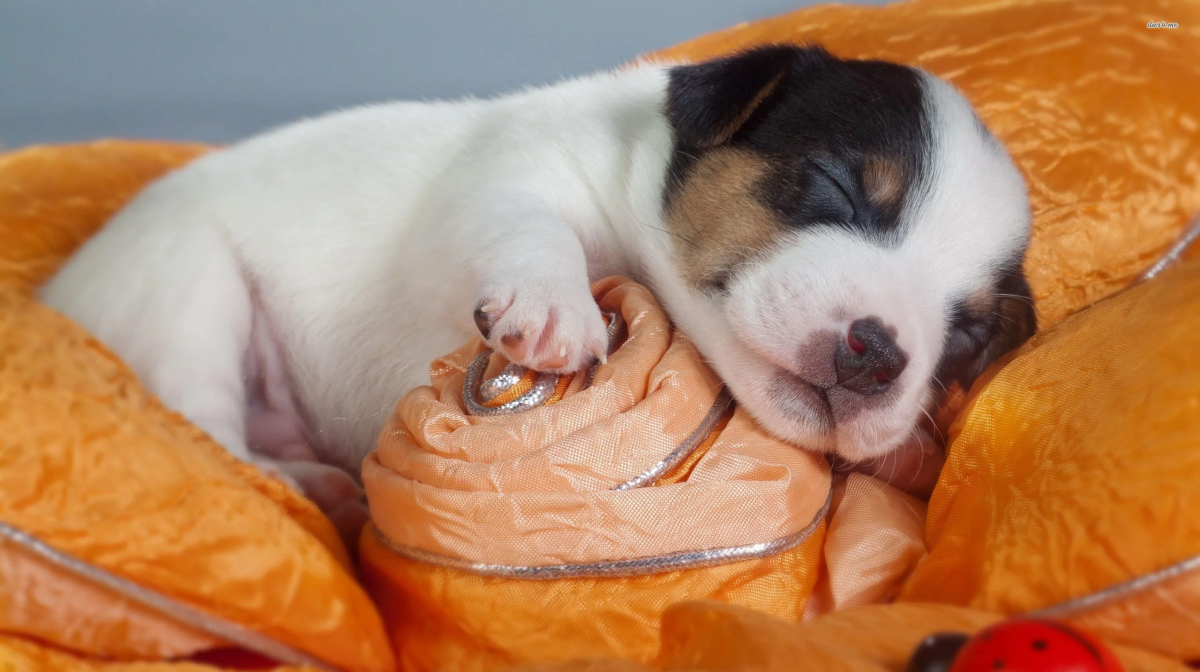
Did you know that newborn puppies can spend 90% of their day sleeping with their littermates? That works out to around 22 hours a day of puppy sleep! While they sleep less when they’re 8-10 weeks old and in their new homes, puppies still need a lot of sleep in the first few weeks and months of their life to support their growth and development. By nature, puppies are polyphasic sleepers and need several naps throughout the day, which can last anywhere between 30 minutes to 2 hours. However, some good news: as puppies age, they gradually become diurnal sleepers - meaning they may still nap, but your puppy will sleep for longer at night eventually!
Understanding how much puppies sleep is one of the many things you need to know about puppies. In this article, we help dog owners understand the importance of their puppy’s sleep and the effects that sleep deprivation can have on their growth and development. We also give an example of a puppy sleep schedule that you can follow as guidance. Supporting your puppy with their sleep early on can ensure they grow into healthy, happy and well-behaved adult dogs, and save you health and behavioural problems in the long run.

How much do puppies sleep?
Newborn puppies need a lot of sleep, so don’t be surprised if yours is sleeping up to 22 hours per day. Puppies need more sleep than adult dogs to support their rapid growth and development in the early stages of their life, and these processes occur in their bodies whilst they’re asleep. By conserving their energy with sleep, your dog is able to build and strengthen their bones and muscles, as well as support their immune system. Puppies should also sleep to help their brain process new information and clear out any toxins from the day.
How much puppies sleep depends on their age, breed and activity levels. Whilst newborn puppies can sleep up to 22 hours, your puppy will need less sleep as they get older. Below we look at how much puppies should sleep at different ages to make them happy puppies.
How much does an 8-week-old puppy sleep?
At 8 weeks, puppies will sleep around 20 hours per day, although this can vary depending on their age, breed and activity levels. Since your puppy will have put on significant size from birth and still growing rapidly at 8 weeks, they will need a lot of sleep.
Compared to when they were newborns, your puppy may have doubled or even tripled in size and weight (depending on their breed) by 8 weeks old. They are also developing their motor skills and becoming more coordinated and confident to explore their surroundings. Whilst your puppy is older, their brains and bodies are still maturing, hence why puppies still sleep up to 20 hours at 8 weeks.
How much does a 10 to 12 week old puppy sleep?
Between 10-12 weeks old, puppies sleep around 18-20 hours per day. They are still growing in size and weight, refining their motor skills and processing new information, which is why they still need a lot of sleep - 12-week-old puppies can sleep up to 8 hours at night.
From how your puppy looked at 8 weeks, at 10-12 weeks old puppies are noticeably larger and heavier, with more definition to their body. At this age, puppies are refining their motor skills and will be more agile than before, which is why you may notice them running, jumping and exploring with increased confidence. Puppies between 10 to 12 weeks old are also more receptive to obedience training and can follow basic commands such as ‘sit’, ‘stay’ and ‘come’. As they become more active and aware, puppies will need plenty of sleep to replenish their energy. A 12-week-old puppy can sleep between 6-8 hours at night, meaning longer stretches are on the way.
How much does a 14 to16 week old puppy sleep?
Puppies between 14-16 weeks old can sleep around 18 hours a day, as their growth and development continues. They may still grow in size, although the rate may be slower than when they were newborns, and their motor, social and cognitive skills are developing well.
At this age, puppies have more stamina and are even more agile, which can lead to bursts of energy and enthusiasm - so don’t be surprised if your puppy is jumping off the walls! Your puppy will also have better cognition and be able to understand more complex commands, which is why it’s also important for dog owners to provide mental stimulation with interactive toys. Puppies should sleep enough to conserve their energy for their development.
How much does a 16 to 18 week old puppy sleep?
A 16-18 week old puppy sleeps between 12-16 hours a day. As your puppy gets older, they won’t need as much sleep as they did when they were newborn. In fact, at this age puppies will sleep longer at night and take fewer naps throughout the day.
This age is a crucial period for your puppy as they will have improved their cognitive, motor and social skills. Since puppies have better bladder control at this age, some may be ready for housebreaking training, and dog owners should continue reinforcing desired behaviours. You should also support your puppy’s confidence by introducing them to new people, animals and environments, to help them develop into well-rounded adult dogs. It’s important for your puppy to sleep as much as necessary to process new information.
Signs Your Puppy Isn't Getting Enough Sleep
If you feel like your puppy isn’t getting enough sleep, this could be cause for concern. Try to ensure your puppy has plenty of opportunities to rest by creating a safe sleeping area with a crate or bed in a warm location, away from family, distractions and noise. In some cases, sleep deprivation may affect a puppy’s growth and development, and lead to potential health issues. Here are some signs your puppy isn’t sleeping well:
Reduced appetite
Excessive lethargy
Irritability
Low activity levels
Anti-social behaviour
Sleep is essential for puppies to build and strengthen their bones, muscles and tissues, and is also important for their immune system and cognitive development.
Below we have listed some factors that could be affecting your puppy’s sleep, and we advise how to establish healthy sleep habits to resolve sleep issues.
Factors That Affect Your Puppy's Sleep
We have already discussed how much puppies sleep can differ at different ages, however, there are other factors that can also impact this - such as their breed, size and activity levels.
If your puppy is of a larger dog breed, it will be growing at a faster rate - in this case, puppies will need more hours of sleep to conserve energy for building their bones and muscles. Otherwise, if your puppy is of a brachycephalic breed, they may have difficulties in breathing which can cause snoring and affect the quality of their sleep. If you are concerned about your puppy’s breathing at any time, you should consult your vet.
While most puppies have bursts of energy, they can still differ in their activity level - which is why it’s important to understand puppy energy levels. Naturally, active puppies will sleep much more than less active puppies to replenish their energy.
How to establish healthy sleep habits for your puppy?
It’s important to establish healthy sleep habits for your puppy early on in their life, to help them become healthy adult dogs. Here are some tips to support your puppy’s sleep schedule:
Create a comfortable and safe sleeping environment.
When you first bring a puppy home, it might be helpful to keep their bed/crate close by so they feel safe whilst they get more familiar with their surroundings. Make sure their sleeping area is comfortable and relaxing by choosing a dark and quiet place, so your puppy can sleep without being disturbed.
Take your puppy for toilet breaks before and after sleep.
By making sure your puppy has a toilet break right before bedtime, you can help your puppy sleep better at night. However, keep in mind that young puppies may still need to go to the toilet as frequently as every two hours. You should take your puppy to the toilet any time they wake up.
Serve high-quality dog food, appropriate for their age.
Puppies need a complete and balanced diet that is designed for their age to ensure they are receiving essential nutrition for their growth and development. By providing your dog with nutritious food, you can support their bodies and facilitate restful sleep. James Wellbeloved™ Puppy Food contains high-quality ingredients and has been specially formulated to look after your puppy’s overall health.
Establish a consistent schedule.
Like humans, dogs also enjoy having an established routine as it can reduce their anxiety. Your puppy will adjust to a sleeping schedule better if you establish it early on in their life. Try to ensure your puppy’s bedtime is at the same time every day, so they become accustomed to their routine and can wind down more easily.
Implement bedtime rituals.
Besides keeping your puppy’s bedtime the same every day, there are also things you can do to prepare them for bedtime. Since most puppies have high energy levels, allow them some time to tire themselves out. You can then begin to calm them down by taking time to cuddle, turning off the lights and regularly using phrases such as ‘goodnight’ so they can associate these actions with sleep.
We have created an example of a puppy’s daily schedule below as guidance for dog owners.
Morning puppy schedule
When your puppy wakes up, take them to the toilet - stay outdoors until your puppy has passed urine/faeces
Immediately give praise and a treat to reinforce desired behaviour
Serve breakfast (here’s some advice on what you should feed your puppy)
Allow up to 30 minutes for their food to digest
Take them outdoors to the toilet again - stay outdoors until they’re done
Immediately give praise and a treat to reinforce desired behaviour
Spend at least 30-60 minutes playing with or exercising your puppy (here are some ideas on puppy exercises and games)
Let your puppy rest for as long as they need
Take them outdoors to the toilet after their nap - stay outdoors until they’re done
Immediately give praise and a treat to reinforce desired behaviour
Afternoon puppy schedule
Serve lunch
Allow up to 30 minutes for their food to digest
Take them outdoors to the toilet again - stay outdoors until they’re done
Immediately give praise and a treat to reinforce desired behaviour
Spend time training or socialising with your dog, or choose a longer activity such as a walk (this will help keep your puppy happy)
Let your puppy sleep into late afternoon
Take them outdoors to the toilet after their nap - stay outdoors until they’re done
Immediately give praise and a treat to reinforce desired behaviour
Evening puppy schedule
Serve dinner (read up on the best dog food for puppies)
Allow up to 30 minutes for their food to digest
Take them outdoors to the toilet again - stay outdoors until they’re done
Immediately give praise and a treat to reinforce desired behaviour
Allow some time for your puppy to play and socialise with family
Begin bedtime rituals and establish quiet time
Take them outdoors to the toilet right before they sleep and wait until they’re done (soon you will be able to toilet train your puppy)
Immediately give praise and a treat to reinforce desired behaviour
Place puppy in the designated sleeping area and say ‘goodnight’
What is a good bedtime for a puppy?
A good bedtime for puppies depends on their age, breed, size and activity levels. Each puppy has individual needs, however, for most puppies, it doesn’t matter what time they go to sleep - as long as it’s consistent every day. You can start by following your dog’s sleep cues.
If your puppy is tired, you may notice them yawning or being less interested in playing - this is their way of telling you how much sleep they need. You can support your puppy’s sleep needs by taking them to their bed/crate. You can also follow our training tips to help your puppy sleep for the best results.
Having a new puppy in the house can be exciting for all the family; their high energy and playful behaviour will keep you smiling! However, it’s important to keep in mind how much puppies sleep and create a puppy sleep schedule according to their age to support their growth and development. Helping your puppy sleep longer at night, when they’re ready, will also strengthen your relationship as you’ll sleep better too. You can join our Puppy Club for expert guidance and nutritional advice for the first year of your puppy’s life, as well as exclusive discounts and offers on James Wellbeloved quality dog food products, to ensure the best start for your puppy.

Related Articles








